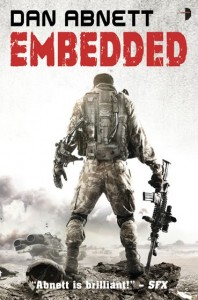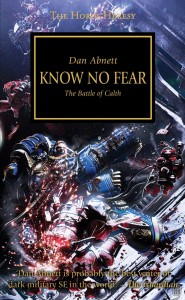Dan Abnett is an author whose name is synonymous with Science-Fiction and future war – be it 2000AD, Gaunt’s Ghosts, the Horus Heresy, Eisenhorn, Ravenor, Doctor Who, Torchwood…
And he keeps going. His most recent book is Know No Fear (out now from the Black Library in paperback, £7.99), the nineteenth book in the ongoing best-selling Horus Heresy series, and depicts the pure bloody carnage of the Warhammer 40K universe’s defining civil war; this time around Abnett is focused on the invasion of the planet Calth by the Word Bearer’s Legion, and their ambush of the Ultramarines. Also out in paperback at £7.99 is Embedded, Abnett’s second novel for edgy indie publisher Angry Robot. Embedded is a stunning novel, tackling themes that Philip K. Dick would be proud. It charts a future ‘cold war’ between two military powers, on an obscure planet, with a veteran journalist caught in the middle. And it is fantastic and you should buy it at the first opportunity.
Dan took some time out from his hectic schedule to answer some questions for the geekzine.
Andy, Editor
Andy Jamieson: Embedded has such an intricate SF plot with loads of detail crammed in; did it take some planning and preparation, or was it a quick turnaround from idea to finished book?
Dan Abnett: I’d actually had the idea festering for a year or two before I wrote it, maybe longer, but the actual brain-to-page process was quite rapid. Once I started writing it, I worked out, and made sense of, all the little devices and ideas I’d hoped to include. So the writing and the sharp focus of realization came in a rush: but the general idea had been brooding for a while.
AJ: Know No Fear is your fourth Horus Heresy novel – what new challenges did this instalment present you, compared to the others?
DA: I wanted to kick more ass than had ever been kicked before. Basically, this one is wall-to-wall, top-of-your-lungs, maximum-impact action. Prospero Burns (the previous one) was also about a big battle, but I spent time explaining why it happened rather than showing what happened. Most people loved it (enough to put it on the NYT bestseller list), but some folks said they were expecting more action. So I thought, right…. you want action? I even shifted the whole book into the present tense to make it even MORE in your face.
AJ: What sort of research does a series like Gaunt’s Ghosts require? Obviously you have to be familiar with the Warhammer 40K universe, but did you also study any real-life military operations in preparation for writing the books?
DA: Yes, a lot. I talk to serving and retired servicemen too. I’ve made a lot of friends that way – a lot of people in the armed services read books like Gaunt, which is flattering and sometimes puzzling (seeing as I’m a professional maker-up-of-things). My basic aim is to make each Gaunt book have its own flavour, in terms of setting, theatre, and type of operation, without – of course – having them do things that an infantry regiment plainly wouldn’t do. So I look at the history of war, and at all the different ways ‘infantry’ have been used in different places at different times.
AJ: As an author who writes both prose and comic scripts, do you feel the need to keep a balance between the two? Does one usually take precedence over the other?
DA: I wrote comics first, then novels came along. I’d always wanted to write both, so I didn’t want to stop writing either. Switching between the two forms keeps me engaged and fresh. It’s nice to write a comic script, which might be complete in a few days, and get a satisfying sense of closure, to offset the long, exacting process of a novel.
AJ: Following on from the Ultramarines movie, have you been approached to write anymore Warhammer 40K movies, or film scripts in general? And how was the experience of working on the Ultramarines movie?
DA: Working on the movie was very enjoyable, and was a brilliant learning experience in terms of what writing for the screen involves. The film had bad press from some quarters. I think they did a pretty good job, given the limitations (like they had a budget that would have just about financed a single cutscene in a game). I think they deserve a proper round of applause for a valiant first foray into 40K on film.
I am working on other screen projects. I’m just not allowed to talk about them yet.
AJ: How far ahead do you plan your writing projects, and what are you currently working on?
DA: Comics are roughly planned six months or a year in advance. Books are set up two or three years in advance. I think I know what I’ll be writing next year and the year after. Right now, I’m writing Pariah, the first of the Bequin Trilogy, the long awaited follow up to the Eisenhorn and Ravenor trilogies. After that, another Horus Heresy novel called The Unremembered Empire, then the next Gaunt (“Warmaster”). In comics, I’m working on Resurrection Man for DC, New Mutants for Marvel, The New Deadwardians for Vertigo, and the forthcoming Hypernaturals for Boom! Plus Sinister Dexter and Grey Area for 2000AD.
AJ: You are an incredibly prolific author, who works to a consistently high standard; what’s your secret?
DA: I work relentlessly. I am very disciplined. I like what I do, which makes it easier to work stupidly long hours. But I’m a ruthless taskmaster. I don’t take any shit from myself. I get on with it. It’s what I do, so I take it seriously.
Many thanks to Dan for his time, and to Jim Taylor for helping put together the questions.
Andy Jamieson
ps – check out Dan’s website – www.danabnett.com – for all your Abnett awesomeness.



